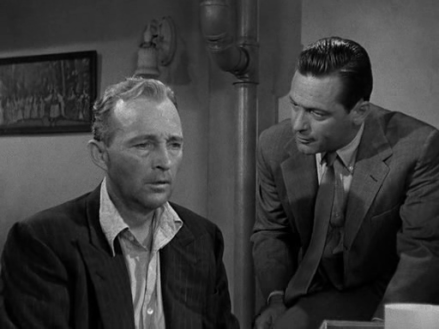THE COUNTRY GIRL, one of 1954s big popular and critical hits, is a strong showcase for its three stars, Bing Crosby, William Holden and Grace Kelly, who nicked a surprise Oscar win for Best Actress, earning hisses from Judy Garland fans who thought her A Star Is Born was a lock. George Seaton directed and wrote the Oscar-winning script, adapted from Clifford Odet’s play.
“It’s a pity that Leonardo da Vinci never had a wife to guide him, he might have really gotten somewhere.”
Directing a Broadway musical, ‘Bernie Dodd’ (Holden) convinces the wary producer to cast once-popular ‘Frank Elgin’ (Crosby) in the lead, despite Elgin’s reputation as a boozer. The skittish Frank relies heavily on his strong-willed wife ‘Georgie’ (Kelly), and she clashes with Dodd, whose own marital history has left him bitter. Exacting and exasperated, Bernie finds the Elgin’s carefully camouflaged relationship more complicated than it seems.
The performances, especially Crosby’s and Holden’s, hold up much better than the script, which wobbles between the pungent and the pretentious, and takes a jarring left-turn in the third act that’s unconvincing. Kelly, deglammed (mousy hair, glasses, rack-clothes) to look, well, less like a 24-year-old Grace Kelly, is good. But Oscar-worthy? Nah. In retrospect, it seems more like critics (she scooped the other big prizes that year) were more seduced by her charm than talent. Holden (ironically playing someone trying to keep someone else from drinking, the beloved actor’s own curse) once again nails worldly cynicism masking wounded gallantry. Crosby’s is the key role and going against type he’s superb as the guilt-wracked, self-wrecked has-been desperate to regain acceptance and too conflicted to win himself over. Bing’s own self-doubts about tackling the role bled through into a painful portrait of deception and despair.
Besides the questionable wins for Kelly and the script, and Crosby’s well-deserved nomination, other Oscar chances went up for Best Picture, Director, Cinematography and Art Direction. In foregone conclusion all were taken On The Waterfront. The $18,300,000 take ranked 6th at the cash count. *
Harold Arlen & Ira Gershwin wrote the four (lamentably plain) songs performed. With Anthony Ross, Jacqueline Fontaine and Eddie Ryder. Among the dancers spot future ‘Shark’ George Chakiris as well as muscleman Ed Fury, later to become Saturday matinee familiar as ‘Ursus’ and ‘Maciste’. 104 minutes.
* Though a box office and critical hit at the time, the well acted but dated The Country Girl is neglected today while other pictures from the year are celebrated. The critical fave remains On The Waterfront, and the cornball White Christmas is a holiday standard. Much of the luster from Kelly’s coup has been dimmed by the Judy Garland cheering section grouching over her loss for A Star Is Born (Kelly was okay, Garland great). That said, the three stars enjoyed a banner ’54. Crosby’s dramatic acclaim was another present to go with his Xmas story #1 smash. Kelly had Hitchcock winners Rear Window and Dial M For Murder plus joining Holden for The Bridges At Toko-Ri, which he reinforced with Sabrina and Executive Suite.




